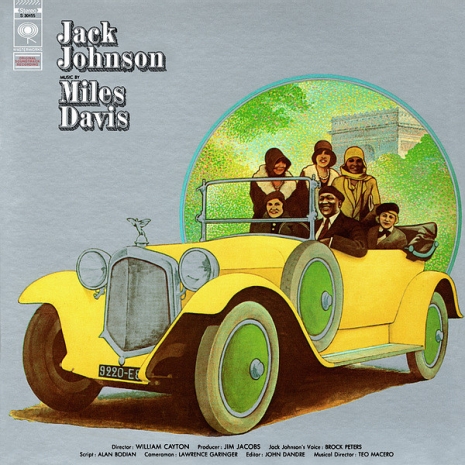
Even people who don’t like Miles Davis’ electric period (!) recognize the greatness of Jack Johnson, one of John McLaughlin’s finest moments, and a record I’d heard dozens of times before I realized it was the score to a movie. Long before
Ken Burns’ Unforgivable Blackness, there was this 1970 documentary by promoter Bill Cayton and fight film collector Jimmy Jacobs.
Jack Johnson was the first black boxer to win the world heavyweight championship. The phrase “great white hope” originates from the terror he struck into the hearts of pale Americans, both by winning the title and enjoying himself in public. His success did not go unpunished. Busted under the Mann Act and sentenced to a year and a day, Johnson skipped bail and fled the country. (In one memorable scene in Jack Johnson, the champ meets Rasputin.)

In his autobiography, Davis writes that he was boxing in the spring of 1970, when he wrote the soundtrack:
The music was originally meant for Buddy Miles, the drummer, and he didn’t show up to pick it up. When I wrote these tunes I was going up to Gleason’s Gym to train with Bobby McQuillen, who was now calling himself Robert Allah (he had become a Muslim). Anyway, I had that boxer’s movement in mind, that shuffling movement boxers use. They’re almost like dance steps, or like the sound of a train. In fact, it did remind me of being on a train doing eighty miles an hour, how you always hear the same rhythm because of the speed of the wheels touching the tracks, the plop-plop, plop-plop, plop-plop sound of the wheels passing over those splits in the track. That train image was in my head when I thought about a great boxer like Joe Louis or Jack Johnson. When you think of a big heavyweight coming at you it’s like a train.
Then the question in my mind after I got to this was, well, is the music black enough, does it have a black rhythm, can you make the rhythm of the train a black thing, would Jack Johnson dance to that? Because Jack Johnson liked to party, liked to have a good time and dance. One of the tunes on there, called “Yesternow” was named by James Finney, who was my hairdresser—and Jimi Hendrix’s, too. Anyway, the music fit perfectly with that movie. But when the album came out, they buried it. No promotions. I think one of the reasons was because it was music you could dance to. And it had a lot of stuff white rock musicians were playing, so I think they didn’t want a black jazz musician doing that kind of music. Plus, the critics didn’t know what to do with it. So Columbia didn’t promote it.
N.B.: This is a 1970 documentary assembled from turn-of-the-century archival footage and sourced from a VHS tape, so it’s a little fuzzy. Let’s hope for a DVD release someday soon.